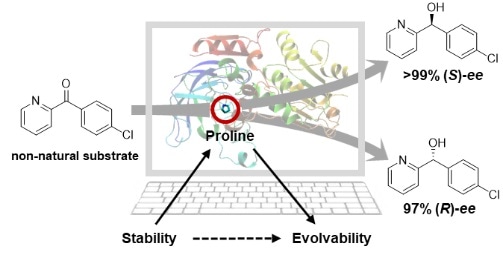Professor Zhoutong Sun from the Tianjin Institute of Industrial Biology of the Chinese Academy of Sciences headed a research team to develop Proline Induced Loop Engineering Test (PiLoT) method.

Utilizing the interfaced proline residues as the "key" to unlock enzyme evolvability and thus access biocatalysts with highly improved catalytic performance. Image Credit: TIB.
This new method enables identifying additional hotspots apart from the usual ones surrounding the active site. The designed mutagenesis can most probably pave the way for variants that can induce conformational dynamics, say the researchers.
During their evolutionary paths, natural enzymes have progressively evolved to be suitable for specific catalytic reactions with innovative functions. In certain instances, the fundamental evolvability was unleashed by modifying the stability through certain amino acid substitutions.
However, it is not so easy basically to identify specific mutational positions in a protein to customize its stability on a tolerable scale to induce conformational plasticity, and thus achieve innovative functions.
The authors of this study used the thermophilic alcohol dehydrogenase TbSADH as the biocatalyst to achieve stereoselective transformation of the hard-to-reduce diaryl ketone, which is of pharmaceutical importance.
They mutated the proline residue (P84) located at the interface of a β-strand and loop region. The resultant mutants resulted in unusually high (S)- and (R)-selectivity, respectively. This amounted to a high conversion rate of 99%.
Through combined computational analysis, the researchers showed that these mutants became more flexible closer to the active site and thus offered the additional space for a non-natural bulky-bulky substrate to be accepted.
The findings of the study demonstrate that PiLoT makes for a new tool in the rational mutagenesis of enantiocomplementary alcohol dehydrogenase (ADH) enzyme mutants. The tool enables the customization of sufficient ADH stability for allowing essential evolvability.
Source:
Journal reference:
Qu, G., et al. (2021) Unlocking the Stereoselectivity and Substrate Acceptance of Enzymes: Proline Induced Loop Engineering Test. Angewandte Chemie International Edition. doi.org/10.1002/anie.202110793.